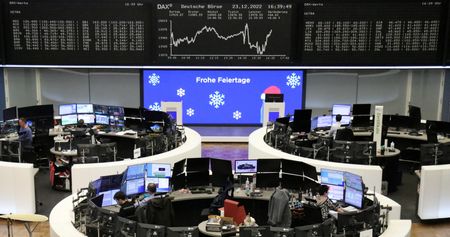By Bansari Mayur Kamdar and Shreyashi Sanyal
(Reuters) -European shares closed a touch higher on Tuesday as China relaxing its COVID-19 curbs more raised hopes of a recovery in the world’s second-largest economy.
The pan-European STOXX 600 index gained 0.1%, kicking off a holiday-shortened week in the black.
China on Monday said it would drop its quarantine requirements for inbound visitors, further easing three-year border controls aimed at curbing COVID. [MKTS/GLOB]
While London and Dublin markets remained closed for the Christmas holiday, most European bourses advanced.
Chinese reopening and the in-line U.S. inflation data on Friday could provide a “minor boost to equity markets,” said Ipek Ozkardeskaya, senior analyst at Swissquote Bank.
China-exposed luxury firms LVMH, Kering and Richemont rose between 1.7% and 2.4%.
The STOXX 600 Personal & Household index gained 0.9%, according to Refinitiv data based on Thursday’s closing price.
Energy stocks added 0.4%, as oil prices jumped on hopes of demand recovery in top consumer China. [MET/L] [O/R]
But OCBC strategist Christopher Wong said “fast reopening can be double-edged sword. There is no let-up in the pace of relaxing COVID restrictions in China despite the surge in cases.”
Traders and analysts said thin trading volumes also influenced market moves.
German companies expect only a mild recession next year despite headwinds from the energy crisis, raw material shortages and a tepid global economy, a Reuters survey showed.
Shares in Germany, Europe’s largest economy, gained 0.4%.
The European STOXX 600 index has lost more than 12% so far this year, and is headed for its worst annual performance since 2018, on fears of economic recession due to aggressive monetary policy tightening by central banks globally.
Among individual movers, Leonteq fell 5.4% after the Swiss fintech firm said it was lowering its profit expectations for 2022 due to reduced client demand in the second half of the year.
(Reporting by Bansari Mayur Kamdar and Shreyashi Sanyal in BengaluruEditing by Vinay Dwivedi, Eileen Soreng and David Evans)





